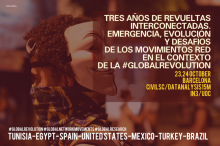TRES AÑOS DE REVUELTAS INTERCONECTADAS. EMERGENCIA, EVOLUCIÓN Y DESAFÍOS DE LOS MOVIMIENTOS RED EN EL CONTEXTO DE LA #GLOBALREVOLUTION

Presentación
La emergencia de las revueltas en Brasil y #OccupyGezi en Turquía de 2013 confirman que nuestras sociedades han visto nacer nuevo tipo de movimientos red a partir del 2011. Hoy estas revueltas interconectadas, no son son una excepción, sino que empiezan a tener una serie de rasgos comunes de autoorganización (tecno)política dentro de la sociedad red.
La secuencia que se abrió en 2011, como conjunto de acontecimientos impulsó revueltas interconectadas en países alejados entre sí, inaugurando una nueva especie de comportamiento común, político y autoorganizado. Los levantamientos en el mundo árabe, especialmente en Túnez y Egipto; la experiencia del 15M en España, también llamada #spanishrevolution o “movimiento de los indignados”; la expansión en Estados Unidos del movimiento Occupy, a partir del acontecimiento originario OWS (Occupy Wall Street); el nacimiento en 2012 del movimiento YoSoy132 en México... todos estos procesos componen un mosaico de revueltas interconectadas con claras referencias permanentes entre cada uno de ellos. Una emergencia contagiosa de redes ciudadanas sin organización formal previa que, haciendo uso de las redes sociales digitales, de la telefonía móvil y de internet, consiguieron erosionar la legitimidad de los poderes constituidos, articulando la toma del espacio urbano con una guerrilla infomediática distribuida.
Para este encuentro, cuyo objetivo es avanzar en la comprensión de los complejos procesos de los movimientos red, proponemos trabajar en:
- El desarrollo de un espacio de traducción de experiencias y comprensión de las coyunturas y desafíos que cada uno de estos movimientos suponen.
- El tejido de una red global de investigadores de estos procesos. Un espacio de intercambio de conocimientos, bases de datos, experiencias, metodologías, análisis de las virtudes, límites, problemas y potencias de estos movimientos en conjunto y por separado.
- Poner las bases para un estudio comparativo global, que profundice en la historia concreta de estos movimientos red, de lo que tienen en común, de las diferencias que tienen entre sí. Un estudio que permite pensar globalmente el conjunto de revueltas interconectadas.
Puedes consultar el Programa aquí
---------------------------------------------------------------------------
(English Version)
Presentation
The emergence, in 2013, of revolts in Brasil and #OccupyGezi in Turkey confirm that our societies have seen the beginning of a new type of network movement, a process started in 2011. Today, these interconnected movements are not an exception, but rather display a set of common characteristics of (techno)political self-organization within the network society.
The sequence begun in 2011 as a set of events promoting interconnected revolts in countries far away from each other, which inaugurated a new species of common, political, self-organized behavior. The uprisings in the arab world, specially in Tunisia and Egypt; the experience of 15M in Spain, also called #spanishrevolution o “indignados (outraged) movement”; the expansion of Occupy in the US, started with the originary event "Occupy Wall Street" (OWS); the birth of the YoSoy132 movement in Mexico... all of these processes constitute a mosaic of interconnected revolts with clear references to one another. These were citizen networks without a previous formal organization, which, by using digital social networks, mobile phone technology and the Internet, were able to erode the legitimacy of constituted powers, taking the urban space through a distributed infomedia guerrilla.
For this meeting, our objective is to advance the understanding of the complex processes that characterize these network movements. We propose to work on:
- Developing a space for the translation of experiences and the comprehension of the conjunctures and challenges that each of these movements face, or have faced.
- Constructing a global research network devoted to study these processes. A space for exchanging knowledge, databases, experiences, methodologies, and analyses of the virtues, limits, problems and powers of these movements, jointly and separately.
- Laying the foundations of a comparative global study. This study would dig into the concrete history of these network movements, into what they have in common, into their differences. This would be a study that allows to "think globally" this set of interconnected revolts.
Program here
Register here
